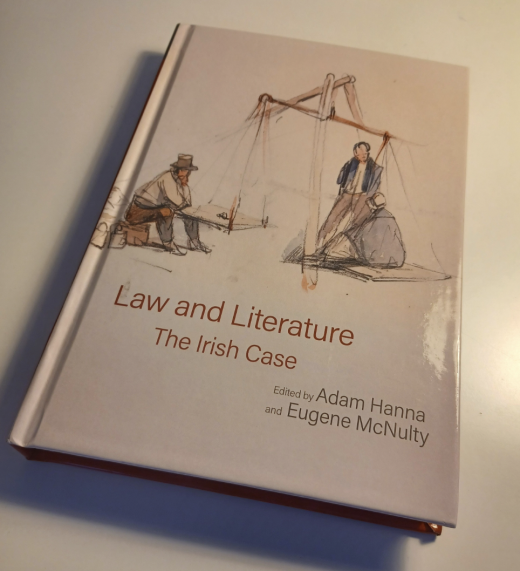
The legal humanities are a global phenomenon; the newly-established Legal Humanities Working Group in the Irish Humanities Alliance is interested in the ways in which they have been, and continue to be, pursued and practised across the island of Ireland. This new working group, led by Eugene McNulty (DCU) and Adam Hanna (UCC) is made up of scholars of humanities disciplines and of law.
The legal humanities might be said with the emphasis on either word. With the emphasis on ‘legal’, they are concerned with how legal processes, institutions and changes are influenced by or interact with the wider culture. For an Irish example of work in this category, one might look to the late Nial Osborough’s 2007 book about the use of literary quotations by judges in common law jurisdictions. At the other end of the legal humanities spectrum, more humanities-based work is concerned with the cultural artefacts themselves: how plays, novels, poems, and films are influenced by, or represent, legal processes and changes. Work that illuminates literary texts by considering their legal elements includes, for example, Rebecca Barr’s recent book chapter on the representation of rape trials in contemporary literature, or David Kenny’s article situating Seamus Heaney’s The Burial at Thebes as, among other things, an illustration of the complexities of multi-level citizenship in Northern Ireland. These latter two scholars’ works remind us, respectively, of two important distinguishing elements of the Legal Humanities in Ireland. One is that the contemporary study of this field is inseparable from recent developments regarding women’s rights; the second is that Irish Legal Humanities are bound up with the long outworkings of the century-old partition of the island.
The possibilities for an Irish grouping with an interest in the Legal Humanities were made clear in a 2019 conference that we organised at DCU. We were aware, when we organised it, of the ancient vintage of legal-literary crossovers in Ireland. The oldest extant Irish legal documents, as the scholarship of Fergus Kelly shows, are centrally concerned with poetry as both medium and subject of the law. The subsequent colonial context also gives the Legal Humanities in Ireland a distinctive character. One of our keynote speakers, Heather Laird, reminded the attendees of the conference of how Irish literature showed the widespread presence of ‘unwritten law’, a code that had, in a colonial context, long vied with official law for popular legitimacy. One of the ways in which this ‘unwritten law’ asserted itself was in those artists who, according to Yeats, ‘sang, to sweeten Ireland's wrong, / Ballad and story, rann and song’.
The study of the Legal Humanities in Ireland also has a significant bilingual context. One needs only to remember, Colum Kenny reminded us, that the poet-revolutionary Patrick Pearse undertook his only case as a barrister in defence of a trader in Donegal who ran afoul of the law by displaying his details on his vehicle in Irish. The central place of the Irish language was also underscored by the presence of Margaret Kelleher, whose book addresses how the miscarriage of justice suffered by Irish-speakers at Maamtrasna in County Galway at the end of the nineteenth century haunted later Irish writers, most famously James Joyce. By the time we held our conference in 2019, there had already been a small explosion in scholarship connecting the works of Joyce to the law. Our impression that something was afoot was strengthened when, after the conference, colleagues in Italy got in touch with us to launch a new Irish-Italian project on the language of the legal humanities.
The sketch in the paragraph above only gives a flavour of the wide array of legal humanities work that is being pursued in Ireland, and in relation to Ireland, today. We hope soon to bring some of these strands together with a study day devoted to representations of the Greek heroine Antigone by Irish artists. She is a figure well suited to the convolutions and convulsions of Irish history over the last century. The poet and senator W. B. Yeats paid tribute in a poem to Antigone's power to 'hurl / Heaven and Earth out of their places'. This planned event, the first organised by the Legal Humanities Working Group will be a one-day symposium that will explore the enduring influence of this ancient Greek heroine in Ireland.
Since it was first performed in ancient Greece, Sophocles' Antigone has raised vital and troubling questions. Antigone refuses to yield to more emollient voices, and demands that her brother be laid to rest with all customary respect. King Creon, similarly, refuses to compromise, and insists that her brother, as a lawbreaker, must go without traditional burial rites. When is it right to defy the law? When does rebellion become a necessity? What price should one be willing to pay to follow one's conscience?
The number of Irish versions of this play is testament to the ongoing fascination of Irish artists and audiences with these questions. It’s continuing power in Ireland is perhaps connected to Ireland’s history as an island which has had a historically troubled relationship with the Creon of official authority. The importance of this play to the nation was further proven when Seamus Heaney, by then the de facto national poet, was commissioned to write a version of it – The Burial at Thebes (2004) – to mark the national theatre, the Abbey's, centenary in 2004. The one-day event that we are planning will bring together academics, jurists and practising artists - including the novelist Carlo Gébler and playwrights Marina Carr and Darren Murphy - to explore Antigone's continuing ability to provoke, disturb, and inspire. Antigone, like the legal humanities themselves, has been adopted and adapted in various contexts across the globe, but has a distinctive history and presence here.
References
Barr, Rebecca. 2022. “Rape Narratives, Women’s Testimony, and Irish Law in Louise O’Neill’s Asking for It and Winnie Li’s Dark Chapter,” in Law and Literature: The Irish Case, ed. by Adam Hanna and Eugene McNulty (Liverpool: Liverpool University Press).
Gébler, Carlo. 2021. I, Antigone (Dublin: New Island Books).
Hanna, Adam, and Eugene McNulty (eds.). 2022. Law and Literature: The Irish Case (Liverpool: Liverpool University Press).
Heaney, Seamus. 2004. Burial at Thebes (London, England: Faber & Faber).
Kelleher, Margaret. 2018. The Maamtrasna Murders: Language, Life and Death in Nineteenth-Century Ireland (Dublin: University College Dublin Press).
Kenny, David. 2021. “‘Love Mounts to the Throne with Law’: Citizenship in Northern Ireland and Seamus Heaney’s Antigone,” Law and Humanities, 15.2: 195–218. <https://doi.org/10.1080/17521483.2021.1983270>
Laird, Heather. 2005. Subversive Law in Ireland, 1879-1920 : From “unwritten Law” to the Dáil Courts (Dublin: Four Courts Press).
Murphy, Darren. 2022. X’ntigone: After Sophocles (London: Methuen Drama)
Osborough, W. N. 2008. Literature, Judges and the Law (Dublin: Four Courts Press).


